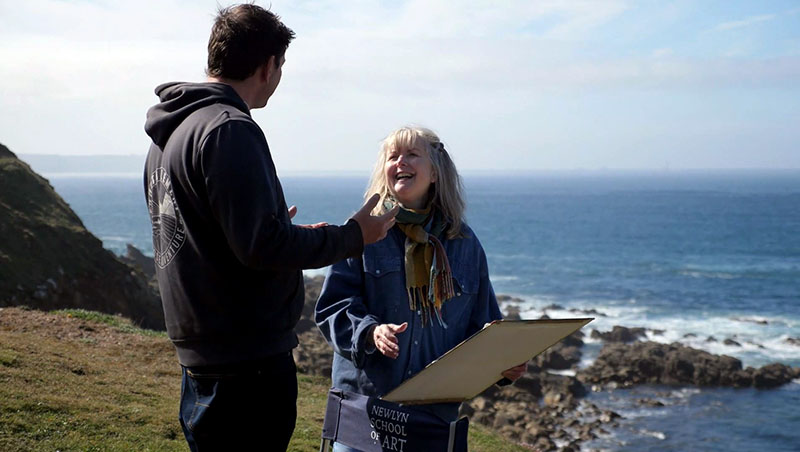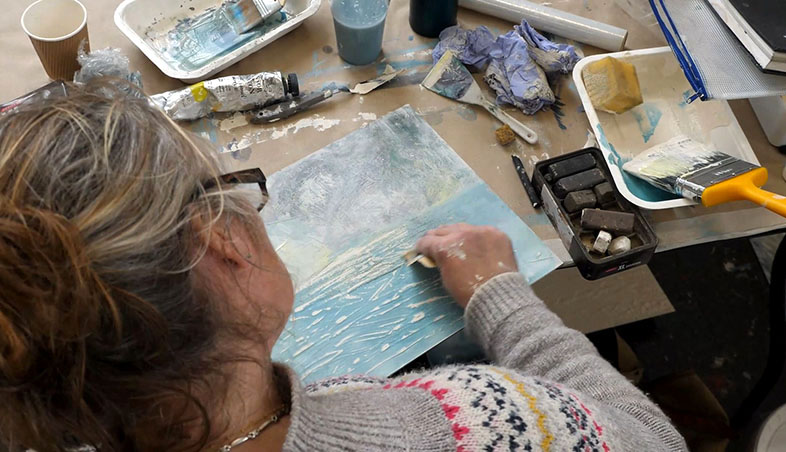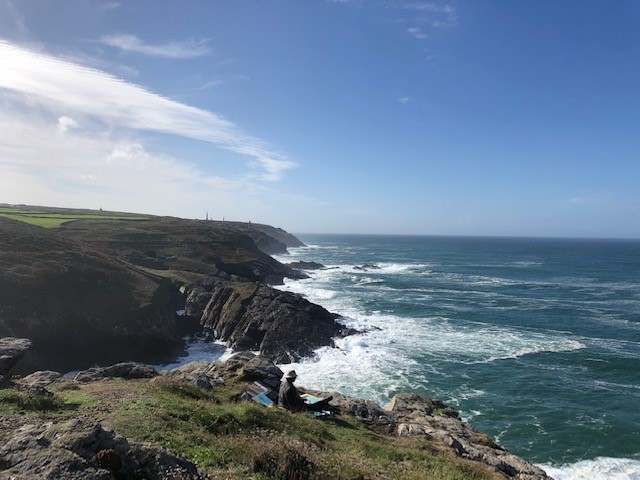Luke Knight's gentle and observant sea and landscapes make expressive painting look beguiling easy. As a relative beginner artist myself, who has been too busy learning to make things look ‘right’ to spend time trying to express how something makes me feel, I thought Newlyn School of Art’s 3 Day Expressive Landscape course might be a great starting place to learn to ‘let go.’ I also hoped to pick up some of the basic grammar of Luke’s techniques.

The course started at 10am, with the 12 of us gathered around the coffee and biscuits, introducing ourselves and, at Luke’s invitation, explaining briefly what we were hoping to get out of the course. A few of us had sold bits and pieces, but were now stuck in the same old groove and so needed distraction and reinvention. Some were just trying to get better or to reboot the habit of ‘making’ that had stalled during Covid. I just wanted to free myself of grids and accuracy, to be taught the basics of layering and loosening up and just feeling the moment instead.
Luke was keen to make the point that we would be working throughout the 3 days on lots of things at the same time, “so that if you get stuck you can move on to the next one.” The logic was that by leaving space in between working on each picture we’d perhaps have more of an objective view of what we had made when we came back to it. Some previously dismissed mark, shape or patina might perhaps catch our eye anew, and with promise. The message of the course was clear: what we build on today we can build on tomorrow.

Sketching outdoors is a daily event on this course. On that first day our mid-morning journey to Cape Cornwall in the art school’s bespoke minibus was chatty and friendly, with Penwith flaunting her famous wares through the bus windows: the bright and windy skies billowing over rusty hedgerows, the spatters of rocks, herds of cows and parliaments of rooks laying or gathering on the bright green fields. It was all very beautiful.

We tipped out onto a coastline – its coves and hills, mines and boulders beaten and pummelled by push-me-pull-you winds and waves – and found a spot in a field to draw. Charcoals and pencils to hand we set about capturing the shapes of the headlands, of the rolls of boulders, of the fluffy downs and jagged rocks – going over and over the lines, not necessarily looking at the page – to get the rhythm of the forms.
A couple of hours later, back in the studio again, Luke asked us to “Think about some of the sketches that we did earlier. Take some of the shapes and lines and start to find these with a paintbrush. Today we’re using acrylics only due to drying times.”
And this was the rhythm for the course: assemble together in the morning, quick chat about what to get out of the day, then off (first day) to Cape Cornwall with its variety of coves, horses, islands and houses, (second day) to Botallack’s windy, bleak and dramatically melancholic tin mines and cliffs and (last day) Pendeen Point (properly awesome in its beauty. I mean it’s really something else). We’d then return to the studio – grabbing a hot drink, examining sketches and paintings, exhaling sighs and tuts and suddenly everyone sanding and scraping, mixing and cleaning, stirring and painting – before another informally presented tutorial from Luke.

The second day Luke introduced the use of texture pastes – applying with a pallet knife to create certain textures for paint to gloop into, and perhaps then sand back when dry before adding other layers. “It can be good for the painting to feel like an object.” We learnt about using the scraper to push the paint across the picture and using a wide paint brush to help control the colour to get wonderful subtleties of tone. He suggested good old masking tape for interesting edges to create bold contrasts and we began enjoying how different applications of paint show off each layer’s strengths.

I really wasn’t convinced by anything I was doing, and it would have been so easy at this point to lose heart in what I was producing but for the fact that everyone on the course was fun, interested in each other’s work, and encouraging too. A little chat, or a little tip or word of encouragement all helped, and of course you soon realise that almost everyone has The Doubts.
But once we were allowed to start messing with the oils and mediums things started to come together for me and I was a pig-in-clover by which I mean I was making a happy mess. Frustratingly Luke would make everything look implausibly easy. A smear here, a spatter there, a scrap and a scratch and suddenly it’s deep turquoise water glooping into sunlight shining through a weak winter sun… Mine were heavy handed storms of goop and frustration so I’d move onto the next painting and do something there instead, hoping that perhaps just practice would help me with lightness of touch.

But demystification of process is one of my favourite things in the world (podcast anyone?) and I really felt at this point it was a ‘Whistler, eat your heart out’ sort of a course (or at the least the beginnings of). Discovering the infinite amounts of different textures and finishes is compelling and addictive. It was at that point – with the oils and mediums – that I started wishing we had weeks at Newlyn School, not just days, to experiment and be taught.

The third and last day – after our return from Pendeen Point – things started to consolidate. I felt less worried about being ‘a beginner’ or about what everyone else was doing, or about going away with any kind of finished product to ‘show off’, and more interested in what I was doing in the present. I picked up and messed about with my six paintings (binning two) and remembering Luke’s advice that “Some of the best paintings come from frustration, but you have to let them sit.” Tips like this, together with his techniques (I took copious notes) and a respect for Luke’s ability to capture the mood of a moment in his art, is what made this course hugely worthwhile.
The most meaningful advice from Luke was undoubtedly, “Don’t worry – enjoy the process. Don’t try to paint – just paint.” The master has spoken. Time to go outside and practice.
You can find out more about the course plus available dates and watch a short film about the course on the Expressive Landscape course page.
Blog article by Fanny Johnstone